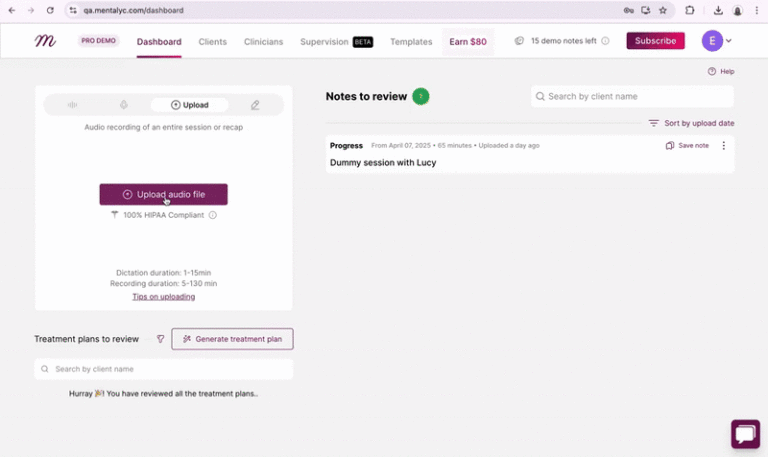Have your progress notes written for you automatically
In Case You Are Wondering About “What Are Progress Notes in Mental Health and How to Write Them?”, This Blog Is for You!
When interviewing new clients, most therapists insist on delving deep into the famous question: “What were the effects and upshots of previous counseling, if any?” This is one of the smartest ways to embark on the psychotherapeutic journey with your client as it helps you appreciate what has, or has not, worked with them in the past.
Be that as it may, you will find the client reiterating a single assertion: “I had gone to counseling for several years in which no improvements took place.” And because you have had enough of hearing that as a therapist, we are sharing with you a smarter, more objective way to assess a client’s emotional-behavioral changes post-previous psychotherapy: by reviewing “progress notes,” the cornerstone of this article.
This article will help you not only understand the purpose of progress notes but will also equip you with the secret ingredients to writing effective ones, which will be of utmost importance not solely for you as an audience referring to such notes throughout the counseling process, but also for other healthcare providers, thereby acting as a common thread keeping everyone in the loop on the patient’s treatment.
This is why we will provide you with valuable guidelines on how to write effective progress notes by outlining the importance of and the several available types and templates of progress notes. You will be armed with our top recommendations for excellent record keeping, which can safeguard your patients’ well-being while ensuring you meet the requirements for relevant regulations and standards.
What Are Progress Notes?
The most crucial step of a competent counseling journey involves a breadcrumb trail: documenting where the patient has been and what you have done together so far. That is, for therapy to truly be effective, it must lead to progress when it comes to your patient’s well-being; and documentation of all aspects of mental health treatment is the most crucial written evidence demonstrating that treatment has been on target, and this must be your target as a therapist! Yes, you might be thinking: “Writing notes that capture all the required information in a concise, organized, and efficient form while meeting my patient’s therapeutic goals must be an arduous task.” And here comes our role!
In the not-so-distant past, documentation consisted of little or nothing more than verifying that an interview with the client took place, leading to a diagnosis, perhaps making a treatment plan, and writing rudimentary progress notes. Because there were few specific standards, documentation was a matter of subjective opinion and was not given much attention.
Parallelly, insurance companies paying for mental health services list few or no documentation requirements to validate a diagnosis or the client’s need for services. The situation nowadays is, however, quite different. Third-party payers nowadays demand evidence that demonstrates both the need for and effectiveness of mental health treatment. As such, if services are not properly documented, even the most skillful therapist could appear, on paper, to be ineffective with clients for the sole reason of inadequate documentation. And here comes the role of progress notes.
Progress notes, the focus of this article, are records documenting what happens in therapy: the session’s length, type, content, interventions, and the level of therapeutic progress being made. Written and accessible by all the patient’s healthcare providers, progress notes act as a common thread, keeping everyone in the loop on the patient’s treatment.
Therefore, clinicians must be certain that therapy progress notes are written clearly enough that an independent reader can ascertain the client’s diagnosis, current issues, and effects of therapy. It is also necessary for progress notes to document a client’s functional impairments that have led to the medical necessity for services, plus the course of treatment directed toward alleviating those impairments, ensuring the cost-effectiveness of the treatment, and serving the client’s best interest.
In short, think of progress notes as a form of medical documentation highlighting basic details of a therapy session, diagnosis and assessment information, clinical test results, as well as clinical observations about the patient’s current mental health and progress in their treatment plan.
Overall, therapy Progress Notes Should Address the Following Questions:
- What is the current medical necessity for services?
- What topics were discussed in the session?
- What clinical observations were made?
- What therapeutic interventions and techniques were employed and how effective were they?
- What progress or setbacks occurred?
- What signs and symptoms of the diagnosis are still present, marked up or down, or no longer present?
- How and by how much are treatment plan goals and objectives being met at this time?
- What are the client’s current limitations and strengths?
The Secret Ingredients
When dealing with a patient, therapists and other mental health professionals have various responsibilities. These include not only attentively listening to the patient and making sure he does not feel suffering alone, but also taking note of patterns and notable details such as how a patient chooses to articulate themselves, the patient’s presenting symptoms, diagnosis, medications, treatment plans, and prognosis. The table below summarizes progress notes, distinguishing features as per HIPAA requirements.
Progress Notes
Purposes
Progress notes document a client’s presentation, diagnosis, treatment plan, and progress towards achieving their therapeutic goals.
Written and used by
Written and accessible by all the patient’s healthcare providers, in addition to third parties and social workers.
Content
- The client’s presenting problems
- Medical history and diagnosis
- Prescriptions
- Treatment plan
- Symptoms progress
- Other relevant information
Style and Structure
- Concise
- Highly structured
- Formal, objective, and clinical language
Sharing and Privacy
Progress notes are HIPAA-protected and must be stored securely. They can typically be shared with:
- The patient’s other healthcare providers
- Third parties, like insurance companies,
- Patients themselves upon special request.
How To Get It Done Perfectly!
As a therapist, knowing how to write effective progress notes is one of the most important aspects of your career. Well-written notes help you, as a clinician, evaluate the effectiveness of treatment and decide whether changes to the treatment plan are to be made. Add to it that such notes assist the therapist in keeping sessions on track. In simpler words, without notes, therapy sessions could easily escalate to irrelevant chit-chat discussions with no need to further explain.
It is unlikely that, over any length of time, a therapist can remember the specificities of previous therapy sessions’ interventions. By reviewing a client’s progress notes before a session, one can refresh their memories as to the client’s ongoing concerns, treatments employed, and progress towards treatment goals to date. This goes without mentioning that failing to employ best practices for therapy notes can have professional, legal, as well as ethical repercussions.
In short, know how to get your notes done quickly, efficiently, and up to the standards:
1. Be professional and to the point: The progress notes that you are writing today are likely to be read by other healthcare providers at any point your client decides to follow up with them. Opt out of using too many abbreviations that could confuse other providers later on. Writing effective progress notes ensures that anyone following up with the patient at any point in time can get a quick overview of the patient’s history and previous treatment plans.
2. Write objectively: Write in the third person, avoid slang, and do not express personal feelings about a client’s progress.
3. Back up your observations with unambiguous evidence: You should show the reasoning behind your observations. That is if you say a patient presents with a low mood, include clear markers of their affect, body language, or self-reported condition.
4. Make sure of the accuracy of crucial information, including date, time, place, and diagnostic code: These minor-seeming details are of the utmost importance when reviewing notes and inferring the patient’s progress with time.
5. Use a note template: Ready templates can make the note-taking process more organized and less time and energy-consuming while ensuring that you include all relevant information. You can tweak the templates once you are familiar with them to find a system that works for you. There are plenty of formats available to choose from: S.O.A.P., B.I.R.P., and D.A.P. Choose the one that you feel is the best fit for your needs.
Progress Note Templates
The essential ingredients necessary for writing therapy progress notes are generally agreed upon. However, just like any list of ingredients, there are so many ways to combine them to serve different dishes. If we are to translate that into the world of progress notes, we can simply say that there is more than one right way to complete a progress note.
Interestingly, there are more flavors of progress notes than ice cream flavors you have ever tasted. However, the three most widely known note-taking templates are SOAP, DAP, and BIRP.
In Closing
Progress notes are crucial to benchmarking progress and ensuring that you and other providers communicate effectively about a client’s history, treatment plan, overall care, and other essential information. It is possible to be an excellent therapist but have poor documentation skills. And, vice versa, one can be quite adept at documentation but not be extremely helpful as a therapist. Of course, the goal is to be proficient in each of these realms! So, strive to achieve that, and if you need any help along the way, we are here for you!










